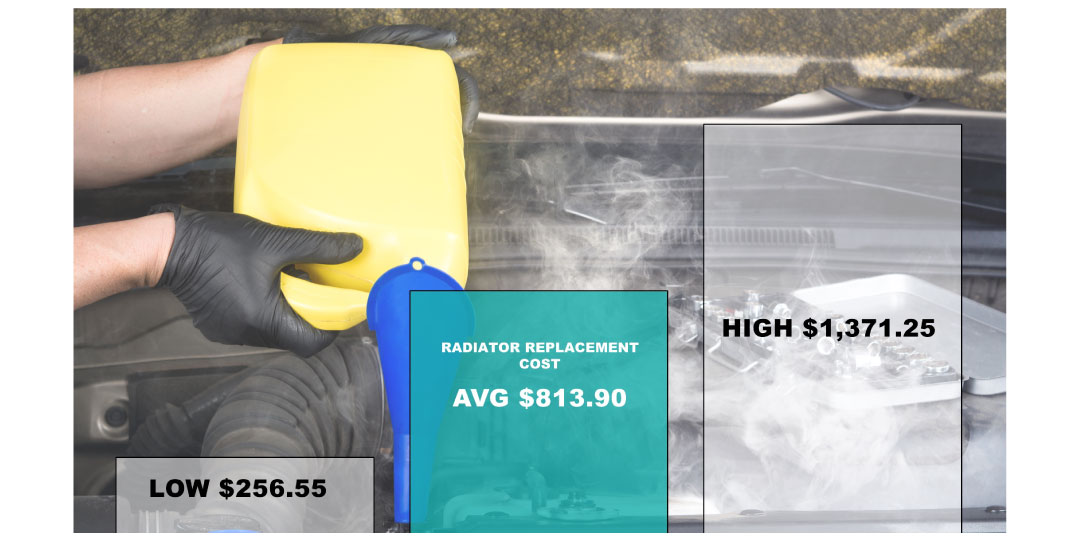The average auto radiator replacement cost is $813.90, with prices ranging from $256.55 to $1,371.25. But usually depends on the make and model of the vehicle you drive and the auto repair shop you take it to.
What is a Radiator?
The radiator keeps the engine from overheating. When it is running, the engine generates heat. Coolant that flows through the system absorbs and eliminates extra heat produced by the engine. The coolant then moves throughout the radiator where it cools off and is then distributed back into the engine and start the process over.
A radiator is comprised of two tanks linked through brass or aluminum tubing. When coolant goes through tubes, the radiator cooling fan pushes air across the radiator to decrease the coolants temperature. Tanks are made of plastic and is not uncommon for them to crack and start leaking coolant. If the tubes crack tank or the tank cracks, coolant will leak, and can cause severe engine damage from overheating. Radiators sometimes tend to clog over time. When this happens, not enough coolant is flowing through the radiator leading to the build-up of heat, making the engine overheat.
Bear in mind:
- When replacing the radiator, the whole cooling system needs to be inspected, specifically the radiator hoses.
- When you get your radiator replaced, it is also a great idea replace the radiator cap and the thermostat.
- After you get your radiator replaced, you should also have it inspected for leaks.
How it’s done:
- Radiator for leak inspection.
- Pressure test the system.
- Replace the radiator.
- Fill the radiator with the correct mixture of 50/50 coolant.
Our recommendation:
Be sure to follow the maintenance schedule recommended by the manufacturer to get the coolant replaced on a regular basis. It is a good idea to have the coolant changes every 25,000-40,000 miles. higher engine temperatures, it is unavoidable that the tanks in the radiator will typically crack. Replacing the coolant will guarantee it is free of contaminants like rust or scale that can stop it from flowing through out the radiator and engine. The thermostat needs to also be replaced when replacing the radiator in addition to any necessary radiator hoses. The cooling system needs to also be flushed out to remove any contaminates.
Can I drive with radiator issues?
An under-performing radiator has far reaching effects. A failed heater, coolant loss, or engine damage from an overheating radiator can occur. Overheating causes damage to an engine. Continuing to drive an overheating vehicle can disable the motor.
What are some common symptoms indicating you may need to replace your radiator?
- Overheating Vehicle.
- Coolant is leaking.
How crucial is the radiator service?
If a failing radiator is not replaced, the overheating of the engine can possibly lead to serious internal engine damage.
Schedule Radiator Replacement In Scottsdale
In addition to being a full-service gas station, we employee ASE Certified mechanics that work on imports and domestic vehicles alike. When you need a radiator replaced our team is here to help! Stop by Bridwell Auto Center located at 7171 E Lincoln Dr. Scottsdale, Arizona 85253 or by giving Bridwell Automotive Center a call today (480) 948-4781.





